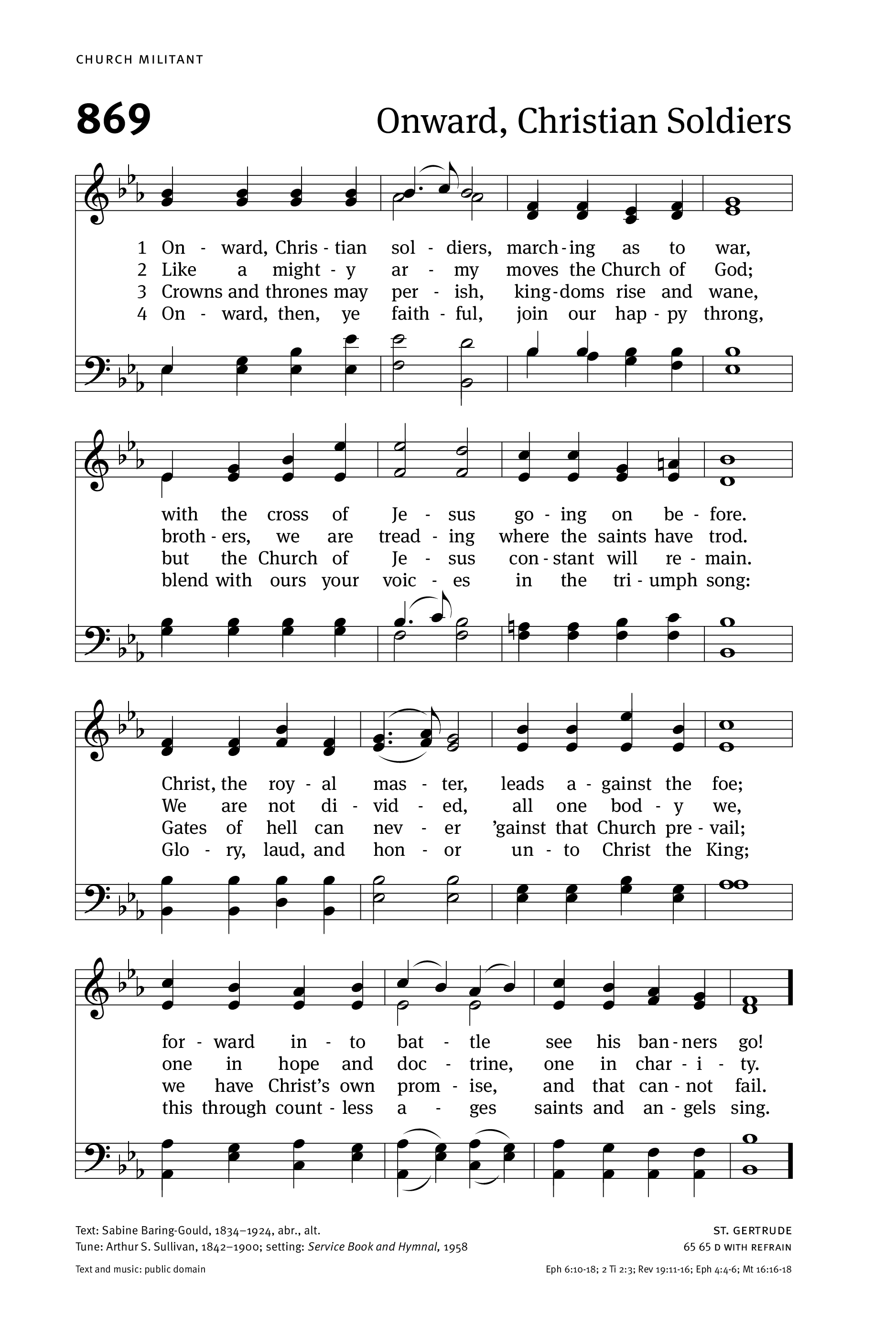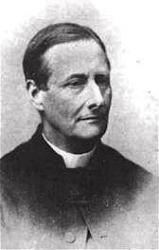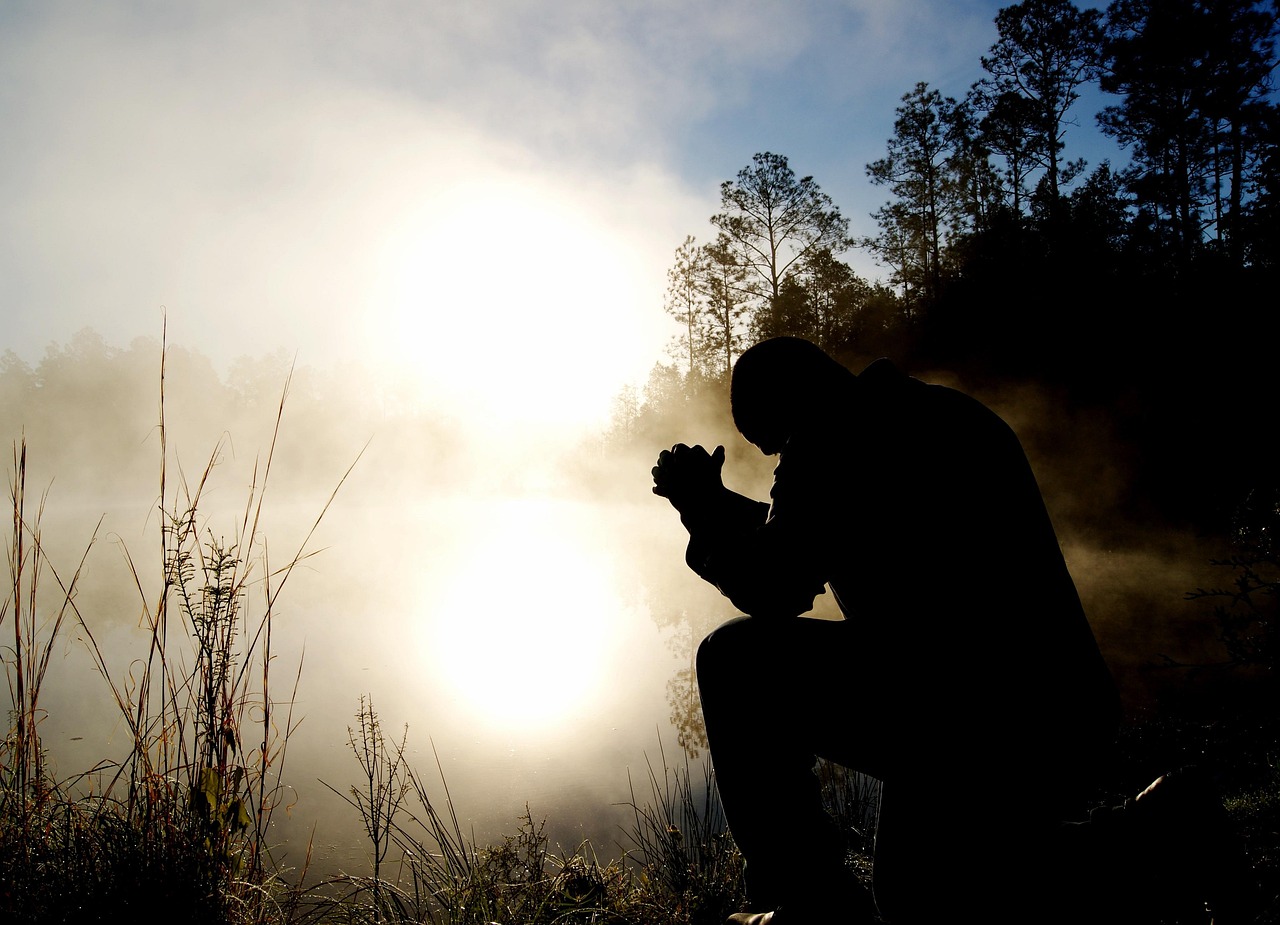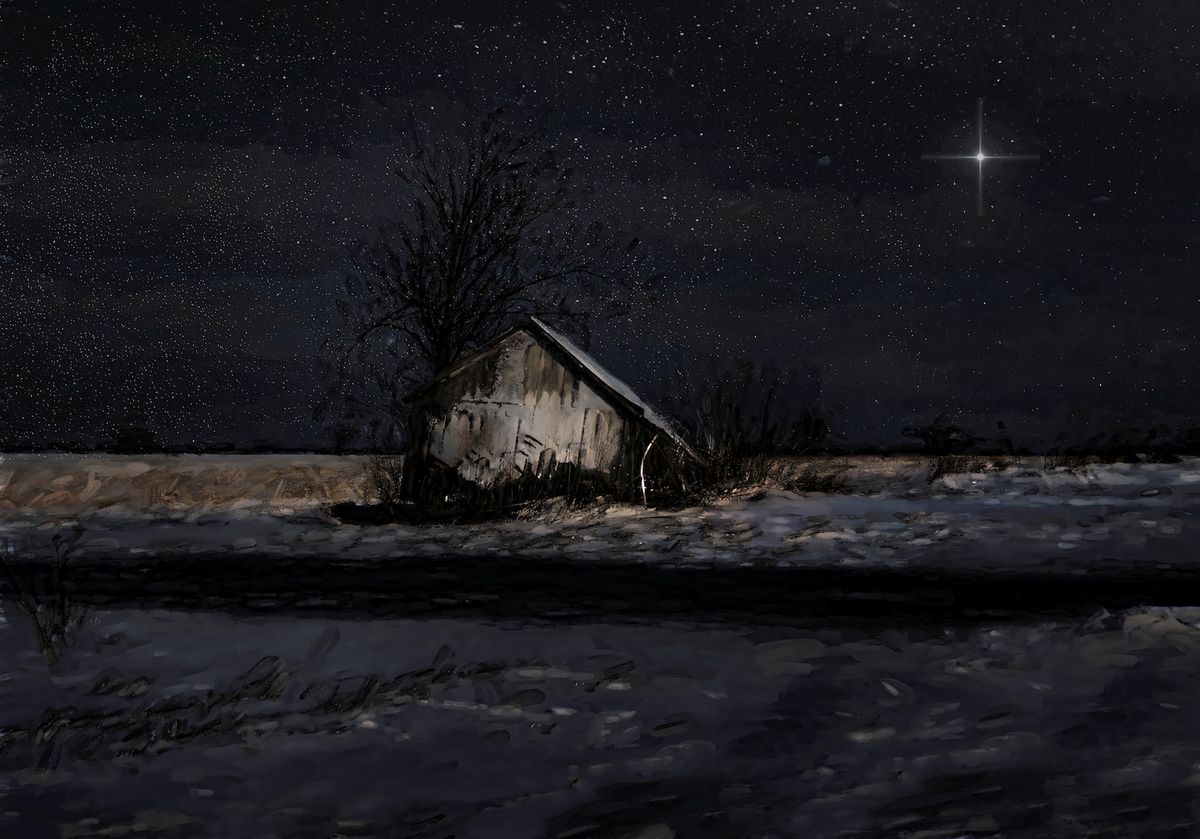Onward Christian Soldiers
By S. Baring-Gould
Lyrics
marching as to war,
With the cross of Jesus
going on before!
Christ, the royal Master,
leads against the foe;
Forward into battle,
see his banner go!
Onward, Christian soldiers,
marching as to war,
With the cross of Jesus
going on before!
Satan's host doth flee;
On, then, Christian soldiers,
on to victory!
Hell's foundations quiver
at the shout of praise;
Brothers, lift your voices,
loud your anthems raise!
moves the church of God;
Brothers, we are treading
where the saints have trod;
We are not divided;
all one body we,
One in hope and doctrine,
one in charity.
join our happy throng,
Blend with ours your voices
in the triumph song;
Glory, laud, and honor,
unto Christ the King;
This thro' countless ages
men and angels sing.
Bible Reference
2 Timothy 2:3
About This Hymn
Author – Sabine Baring-Gould, 1834–1924
Composer – Arthur S. Sullivan, 1842–1900
Tune Name – St. Gertrude
Meter – 6.5.6.5 Doubled with Refrain
Scripture Reference – 2 Timothy 2:3
Key Verse – Thou therefore endure hardness, as a good soldier of Jesus Christ. – 2 Timothy 2:3
"Onward, Christian Soldiers" is one of the most beloved processional hymns in the Christian tradition, stirring hearts with its martial rhythm and triumphant message. Written in 1865 by Sabine Baring-Gould, this hymn was originally composed for a children’s procession in the English countryside, yet it quickly gained worldwide acclaim and became a symbol of Christian unity and perseverance.
Sabine Baring-Gould was a remarkable figure in nineteenth-century England—a clergyman, educator, and a literary scholar of exceptional range. Ordained in the Church of England in 1864, Baring-Gould went on to publish eighty-five books across a wide spectrum of subjects, including theology, folklore, travel, history, fiction, and hymnology. His prolific literary output led the British Museum to catalogue more works by him than by nearly any other author of his time. Yet, in a twist of irony, the work for which he is most remembered today is a simple children’s hymn, written hastily and without thought of publication.
Baring-Gould himself described the hymn’s humble beginnings:
“It was written in a very simple fashion, without thought of publication. Whitmonday is a great day for school festivals in Yorkshire, and one Whitmonday it was arranged that our school should join forces with that of a neighboring village. I wanted the children to sing while marching from one village to the other, but couldn’t think of anything quite suitable. So I sat up at night and resolved to write something myself. Onward, Christian Soldiers was the result. It was written in great haste.”
Years later, he would reflect on its unexpected success:
“I am afraid that some of the rhymes are faulty. I am certain that nothing has surprised me more than its popularity.”
The hymn text contains profound theological and ecclesiastical convictions. One rarely included stanza highlights the Church’s enduring power, rooted in the promises of Christ from passages like Matthew 16:18 and 28:18–20:
Crowns and thrones may perish, kingdoms rise and wane,
But the Church of Jesus constant will remain;
Gates of hell can never ’gainst that Church prevail;
We have Christ’s own promise, and that cannot fail.
Another often-omitted verse reveals Baring-Gould’s deep regard for apostolic tradition and continuity of faith:
What the saints established, that I hold for true;
What the saints believed, that believe I too.
Long as earth endureth, men that faith will hold—
Kingdoms, nations, empires, in destruction rolled.
The hymn’s powerful effect was cemented when it was joined to the rousing tune St. Gertrude, composed in 1871 by Sir Arthur Sullivan—best known as half of the famed Gilbert and Sullivan operetta duo. Born in Lambeth, London, on May 13, 1842, Sullivan was already an acclaimed composer of both sacred and secular music. He wrote the tune while visiting the home of Mrs. Gertrude Clay-Ker-Seymer in Dorsetshire and named it in her honor. The march-like rhythm of St. Gertrude perfectly matched the militant tone of Baring-Gould’s hymn, creating a union of text and tune that has endured for over a century.
Interestingly, the hymn was first sung to the slow movement of Haydn’s Symphony in D, No. 15, though this pairing did not last. The definitive version—featuring St. Gertrude—was first published in the United States in 1873 in Gems of Praise, edited by John R. Sweney and released by the Methodist Episcopal Book Room in Philadelphia.
Though best remembered for Onward, Christian Soldiers, Sabine Baring-Gould also wrote and composed another treasured children’s hymn, Now the Day Is Over. Despite his demanding schedule as both writer and preacher, Baring-Gould lived to the age of 90 and remained active in ministry and scholarship until his final years. He passed away in 1924, yet his “hastily written” hymn continues to inspire Christians of all ages to press forward in faith and unity.
The hymn's message remains as relevant today as when it was first sung by a line of schoolchildren marching through the Yorkshire countryside—encouraging all believers to endure as faithful soldiers of Christ.
Onward, Christian soldiers, marching as to war,
With the cross of Jesus going on before!


📬 Subscribe to Our Devotional Updates
Receive weekly hymns, devotionals, and website features directly in your inbox.
Hymn Information

- Category: Hymn
- Author/Writer: S. Baring-Gould (1865)
- Added: July 4, 2025
- Last Updated: July 4, 2025
- Views: 1794
MIDI File
More Hymns by S. Baring-Gould
Recent Blog Posts
-
 How to Develop a Consistent Prayer Schedule
How to Develop a Consistent Prayer Schedule
Dec 11, 2025 -
 How to Forgive Someone Who Deeply Hurt You
How to Forgive Someone Who Deeply Hurt You
Dec 11, 2025 -

-
 Why Christmas Is Celebrated on December 25
Why Christmas Is Celebrated on December 25
Dec 11, 2025 -
 10 Most Renowned Hymn Writers
10 Most Renowned Hymn Writers
Dec 10, 2025
Visit Us on Social Media
Latest from X (Twitter)
Tweets by HymnalLibraryLatest from Facebook
Latest on YouTube
Daily Bible Verse
Disclaimer
The hymns, sheet music, MIDI files, and related content on this website are provided for educational and research purposes only.
- Public Domain: Many of the hymns featured here are in the public domain and may be freely used.
- Copyrighted Works: Some hymns may still be under copyright protection. Where applicable, permission has either been requested from the copyright owner, or the content is shared under the principles of fair use for educational purposes.
⚠️ Important Notice: If you wish to reproduce, distribute, or use any copyrighted hymn beyond personal study or educational use, you must obtain permission directly from the copyright holder. This website does not grant any rights for commercial use yet.
If there is any other question please address it to us in our Contact Page, for further assistance. Thank you for using the site. May God Bless You.